Keywords are like the bedrock of SEO, my friend. But here’s the deal: If nobody out there is searching for the awesome content you’re crafting, well, you won’t be getting any traffic love from Google, no matter how much blood, sweat, and code you pour into it. It’s all about matching what people want with what you’re offering.
When it comes to SEO success, mastering the art of keyword research is absolutely crucial. Let me tell you why. The consequences of making a mistake in this realm are just too high. Picture this: you pick the wrong keywords, and before you know it, you’ve wasted valuable time and resources. We can’t afford that kind of setback.
And hey, no need to feel intimidated. Trust me, keyword research is anything but rocket science. In fact, in just about 20 minutes, you’ll have a solid grasp of the essentials. However, it’s important to be aware of a few crucial caveats and misconceptions that can make or break your SEO decisions.
So, let’s jump right into it.
Keyword Research Basics
If you’re new to the exciting world of SEO, you might be scratching your head and asking yourself, “What on earth is keyword research, and why is it such a big deal?”
Well, this short chapter is specifically designed to answer those burning questions for you. However, if you’re already well-versed in the art of keyword research, feel free to skip ahead to the next chapter and dive deeper into the SEO goodness that awaits.
What is Keyword Research?
Keyword research is the process of discovering important search queries that your target customers type into search engines like Google to look for products, services, and information.
Why is Keyword Research Important?
If you publish a page on a topic that no one is searching for, that article won’t receive any traffic from Google (or other search engines).
Many website owners make that mistake, and it’s part of the reason why 90.63% of pages on the internet get no traffic from Google, according Ahrefs’ study.
You know what’s awesome about keyword research? It helps you make sure there’s a real demand for what you want to write about. So, when your page climbs the ranks on Google for its target keyword, get ready for a constant flow of eager readers flocking to your content.
How to Find Keyword Ideas
Let’s kickstart your keyword research journey by taking a walk in your customers’ shoes.
Imagine yourself in their position, contemplating the words and phrases they would likely use to seek solutions to their problems. Now, take these valuable insights and feed them into a robust keyword research tool like SEMRush. Brace yourself, because this tool will unveil a treasure trove of thousands of additional keyword ideas that perfectly complement your initial brainstorming.
Mastering the art of keyword research is a straightforward process, but it requires two essential ingredients:
- Solid knowledge of your industry
- Familiarity with keyword research tools
And that’s precisely what this chapter is here to provide.
1. Brainstorm "seed" Keywords
Seed keywords form the foundation of your keyword research journey. They not only define your niche but also play a crucial role in identifying your competitors. When you embark on keyword research using any tool, they will ask you for a seed keyword. This seed keyword acts as the catalyst, generating a vast array of keyword ideas that we’ll delve into shortly.
When it comes to coming up with seed keywords, it’s a breeze if you already have a product or business in mind that you want to promote online. Simply put yourself in the shoes of your potential customers and ponder what they would type into Google’s search bar to find precisely what you offer.
Let’s say you’re in the business of selling outdoor camping gear.
In that case, your seed keywords could include:
- camping equipment
- a tent
- a sleeping bag
- hiking boots
- a camp stove
- and so on
Keep in mind that the primary purpose of seed keywords is not to directly target them with individual pages on your website. As their name suggests, they act as the initial “seeds” for the subsequent stages of the keyword research process. Therefore, don’t get overly fixated on your seed keywords. It should only take a few minutes to identify them.
Once you have a handful of broad ideas relevant to your website’s topic, it’s time to swiftly progress to the next step.
2. See What Keywords Your Competitors Rank For
To fast-track your keyword research, one of the most effective methods is to analyse the keywords that are already driving traffic to your competitors. However, before you can do that, it’s essential to identify your competitors. This is where your brainstormed list of keywords becomes invaluable. Simply enter one of your seed keywords into Google and take note of the websites that appear on the front page of the search results.
If the top-ranking websites for your seed keywords don’t quite match the nature or direction of your own site, it’s time to dig deeper. Expand your search by looking for slightly more specific terms or phrases. This will help you find websites that align more closely with your unique vision and goals.
For instance, if your website revolves around selling outdoor camping gear, you may discover a greater number of direct competitors when searching for specific terms like “camping tent” or “sleeping bag” instead of broader terms like “camping.” This is because search results for more specific product-related keywords often feature e-commerce stores similar to yours, whereas broader terms may yield a mix of blogs and general camping information.
When you come across a competitor website that seems to align with your goals, it’s time to leverage the power of competitive intelligence tools. One such tool, like SEMRush, will become your best friend. By plugging your competitor’s website into SEMRush, you can uncover invaluable insights about their traffic-driving pages and the specific keywords these pages are targeting.
Once you’ve repeated this process with several of your competitors, get ready for a pleasant surprise.
You’ll soon find yourself with a substantial list of relevant keywords that will leave you feeling quite accomplished.
At this stage of your keyword research process, whether the keyword ideas you gather are geared towards informative blog articles or product-focused pages is a determination we’ll make in later stages. For now, your primary goal is to gather a substantial collection of relevant keyword ideas. Cast a wide net and collect as many potential keywords as possible. Don’t worry about their specific intent just yet.
ARE YOU SEEING A LOT OF TOPICS YOU’VE ALREADY COVERED?
If you’re conducting keyword research for an established website, it’s possible that you’ve already targeted many of the keywords your competitors are focusing on. But fret not! There’s a powerful tool at your disposal: the Keyword Gap report in SEMRush. This remarkable feature helps uncover keywords that your competitors are ranking for, but you aren’t.
To use it, plug your domain and your competitors in and click “Compare”.
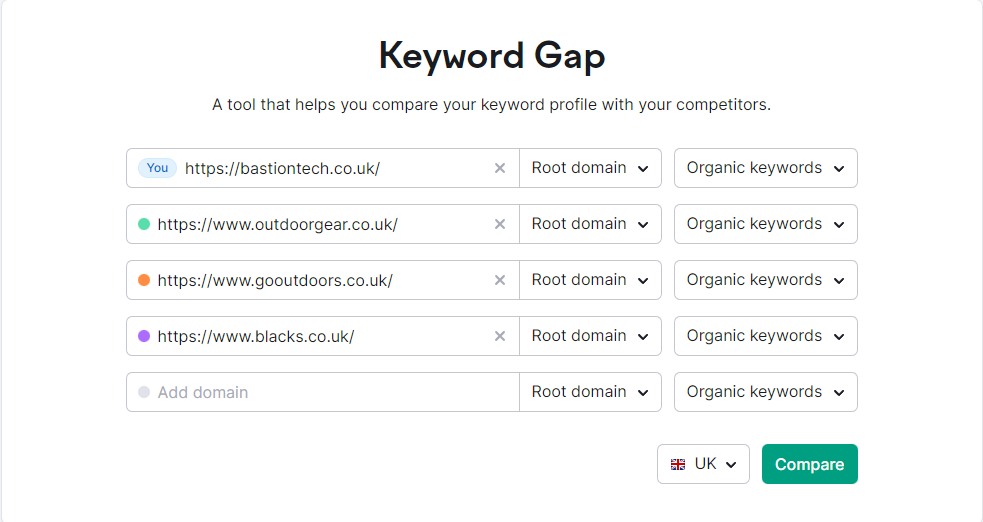
3. Use Keyword Research Tools
Your competitors can be an excellent resource for generating keyword ideas, but here’s the exciting part: there’s a high chance that there are numerous untapped keywords that your competitors haven’t even touched upon yet. This is where the beauty of keyword research tools comes into play.
All keyword research tools operate under a similar principle. It’s a straightforward process: you enter a seed keyword into the tool, and it draws upon its extensive database to generate a wide range of keyword ideas associated with that specific keyword.
When it comes to keyword tools, Google Keyword Planner (GKP for short) stands out as one of the most renowned options. Not only is it freely available, but it’s primarily designed for those looking to run paid advertisements on Google.
However, here’s a little secret: you can also leverage GKP to discover valuable keywords for your SEO endeavours. So, don’t let its primary purpose deter you.
Here are some keyword ideas that GKP has given me for the seed keyword: “outdoor camping gear”
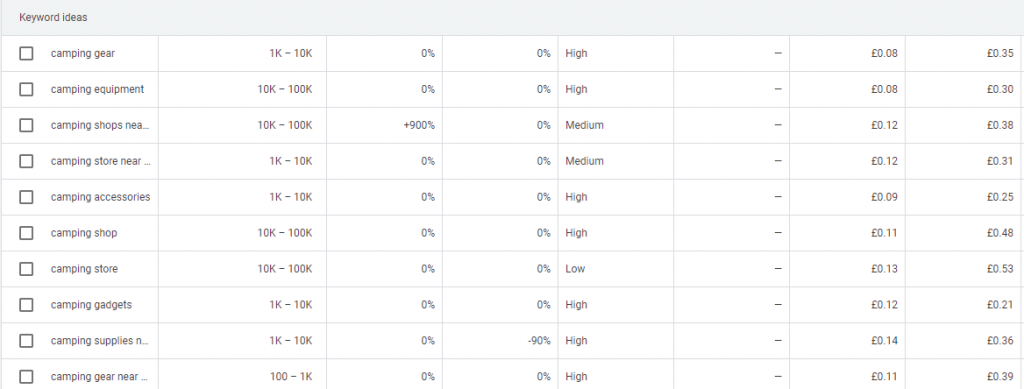
Something important to keep in mind: Google Keyword Planner (GKP) has the ability to generate keyword ideas that may not explicitly include your seed keyword.
This is where GKP proves to be an incredibly valuable tool. It helps you discover non-obvious keyword ideas that you may have otherwise overlooked.
And whenever you discover a new and unique keyword like that, try using it as your new seed keyword and see what kinds of new ideas and rabbit holes you’ll find yourself going down.
In addition to Google Keyword Planner, there exists a variety of other free keyword research tools at your disposal. These tools are fantastic when you’re just beginning your journey, offering a solid starting point. However, as you delve deeper into the world of keyword research, you’ll soon realise their limitations in terms of data and functionality.
Therefore, if you decide to commit to growing the search traffic to your website, you may as well get a free SEMRush trial and start using Keyword Magic Tool
Let’s part in our seed keyword and see how many keywords it gives us:
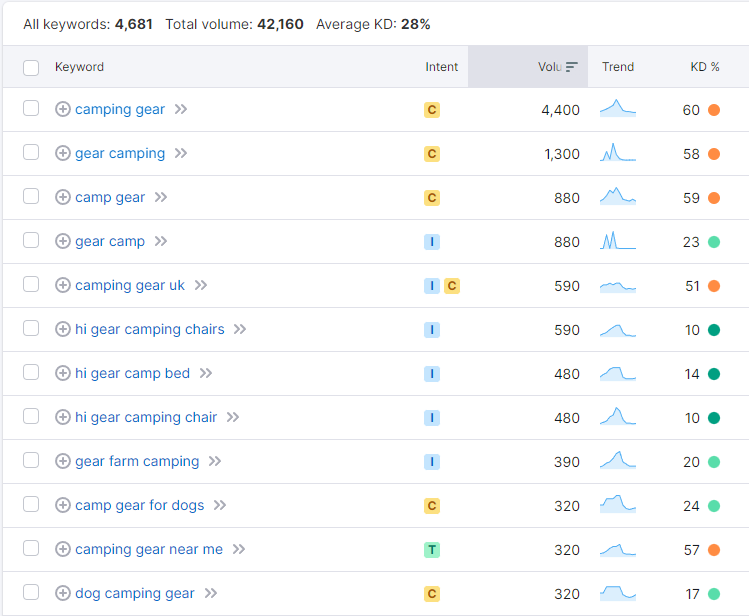
These are just some of the large list of keyword ideas it gives me.
But how do we narrow down phrases that explicitly contain our seed phrase?

Like this.
This appears directly above the keyword idea results.
Let me briefly explain the two main options for you to think about.
Broad Match
With Broad Match, you’ll discover keyword ideas that contain all the words of your seed keyword, regardless of their order or placement.
For example, if our seed keyword is “camping gear” some keyword ideas generated may include:
- “outdoor gear for camping”
or
- “gear camping”
Phrase Match
With Phrase Match, you are presented with keyword ideas that maintain the exact order of the words in your seed keyword.
For instance, if your seed keyword is “camping gear” you may find keyword ideas such as:
- “best camping gear”
or
- “flying with camping gear”
4. Study Your Niche
So far, we’ve covered enough ground to generate a ton of keyword ideas. It’s an incredibly valuable process, but here’s the thing—it can sometimes keep us stuck in a box. We need to break free from those boundaries and think outside the box to get the edge over our competitors.
To break free from the conventional keyword research box, you’ve gotta go where your target audience hangs out. That means hitting up industry forums, groups, and Q&A sites where they’re actively chatting and sharing.
For example, here’s a screenshot of a post I found recently from r/CampingGear:

A quick check in Keyword Magic showed me some decent volume, low difficulty keywords we could be focusing on and ranking for!
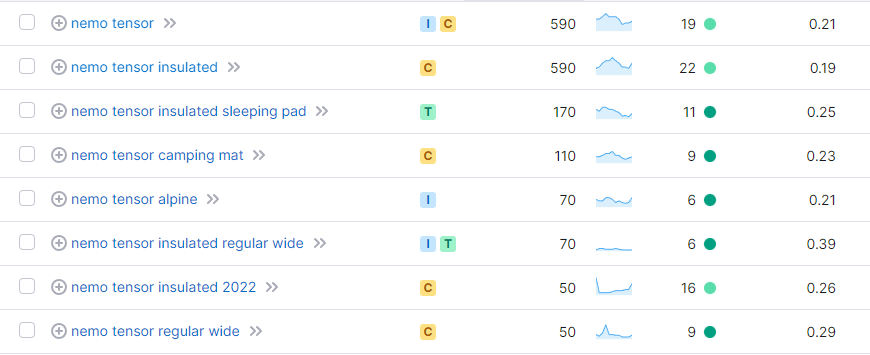
While the volume may seem low, 95% of these keywords have commercial/transactional intent.
If you are getting 590 extra people purchasing your Nemo Tensor, that’s 590 x £230 extra.
An astounding £135,700 worth of traffic and that’s not even including the other results!
Apart from exploring industry forums, your existing customers can be an excellent goldmine of keyword ideas. The next time you engage with them, whether it’s through conversations or feedback, keep a keen ear for the language they use and the common questions they ask. Paying attention to their words can unveil some fantastic keyword opportunities that you might have overlooked.
How to Analyse Keywords
While having access to a vast pool of keyword ideas is great, the real challenge lies in identifying the best ones. Let’s face it, manually sifting through millions of keywords is a daunting task. So, how do you navigate this overwhelming sea of possibilities?
Here’s a simple solution: harness the power of SEO metrics to streamline the process and separate the valuable keywords from the less fruitful ones.
Let’s explore 5 keyword metrics you can use to do this.
Search Volume
Search volume provides valuable insights into the average number of times a keyword is searched each month. For example, “King Charles” has a monthly search volume of 301,000 per month.

There are 4 key aspects to know about search volume metrics:
It measures the number of searches, not the number of individuals – Keep in mind that a single person may perform multiple searches for a specific keyword, contributing to its overall search volume.
Ranking for a high-volume keyword doesn’t guarantee equivalent traffic – Even if you manage to secure the top spot, the traffic you receive from that keyword is unlikely to exceed 30% of its search volume. It’s essential to set realistic expectations.
Search volume is calculated as an annual average – Monthly search volume reported by keyword tools represents the average across the year. For instance, if there are 120,000 searches in December and none for the remaining months, the reported monthly search volume will be 10,000 (120,000 divided by 12 months).
Search volume is country-specific – Keyword tools often provide search volume data specific to the selected country. However, some tools offer an option to display global search volume, which reflects the combined search volumes across all countries.
When it comes to keyword research tools, nearly all of them offer a search volume filter that allows you to narrow down your focus to keyword ideas within a specific popularity range.
This filter serves two main purposes:
- Filtering out high-volume keywords – If your website is relatively new, you may not want to invest time in exploring keywords with monthly search volumes of 10,000+. Don’t waste time on keywords your site will struggle to rank for.
- Filtering for lower-volume, long-tail keywords – On the other hand, you might be interested in discovering uncompetitive keywords with lower search volumes. These are often referred to as “long-tail keywords.” These keywords may individually generate less traffic, but they can collectively contribute significant organic traffic to your website.
Long-tail keywords are like the unsung heroes of SEO. Despite their significance, they often get overlooked in favor of more popular keywords. It seems that many are reluctant to pursue keywords unless they have a minimum of a hundred monthly searches.
In fact, some might completely dismiss keywords that show zero search volume.

Don’t underestimate the power of “zero volume” keywords. While these keywords may bring only a handful of visitors each month if you manage to rank for them, the magic happens when you consider the cumulative effect.
Picture this: if you publish a hundred articles targeting these seemingly insignificant keywords, your annual total traffic could easily accumulate to several thousand highly targeted visitors.
One of the common mistakes made by rookies in the field is disregarding low search volume keywords. However, it’s important to realise that these keywords hold just as much value, if not more, than their popular counterparts. In fact, they can be even more useful due to their specificity and often higher commercial value.
Hey, just a heads up: search volumes can slightly vary from one tool to another. Why? Well, it’s because each tool has its own way of calculating and updating this metric.
All in all, search volume is one of the most important metrics in SEO.
KEEP AN EYE ON SEARCH VOLUME TRENDS
When it comes to search volume, you gotta be a bit skeptical about relying solely on that annual average. Why? Well, here’s the deal: sometimes a keyword might have a massive popularity spike that shoots its average search volume through the roof. But here’s the kicker – that popularity could be short-lived, and the interest in that keyword might actually decline afterward.
Traffic Potential
The UK search results for these two keywords are equal.

Which means you’ll get roughly the same amount of search traffic by targeting either of them. Seems logical, right?
Well, not exactly.
Let’s look at the SERP results for these queries and compare how much search traffic they get in the UK. We can do this by putting in their domains into SEMRush.
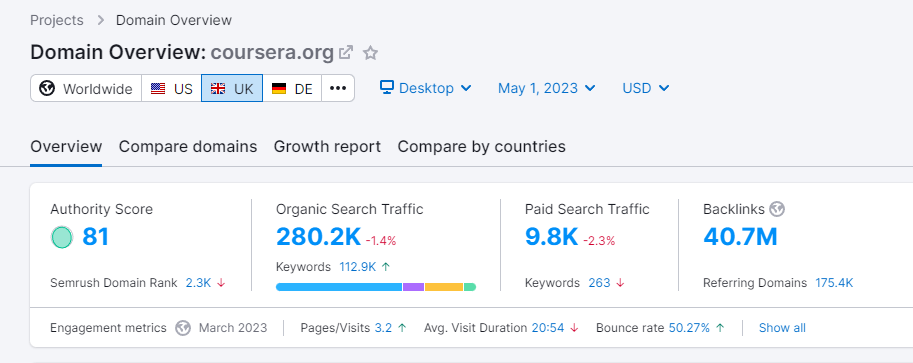
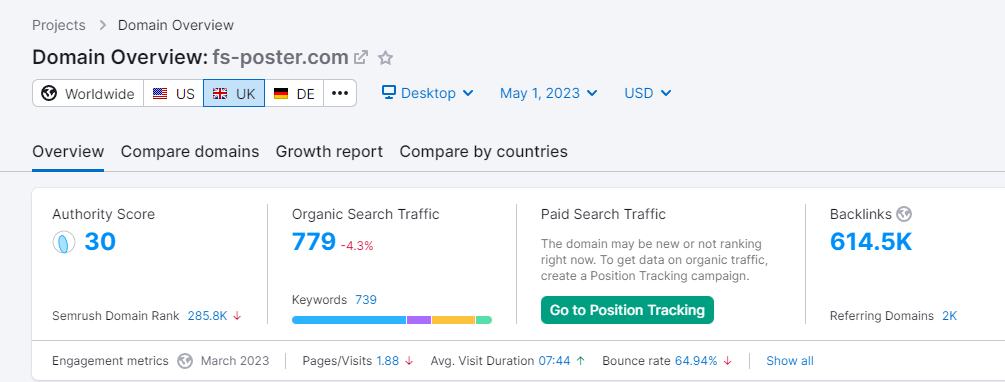
And it turns out that Coursera (wordpress developer) is getting 400x more traffic than fs-poster (wordpress fsposter).
How can that be?
It’s because webpages in Google don’t just rank for one keyword alone. It’s a whole keyword fiesta up in there!
Take a close look at the two screenshots I’ve got for you. Notice something interesting? The top-ranking page for “wordpress developer” isn’t just ranking for that single keyword. Nope, it’s ranking for a whopping 113k different keywords. Whereas the top ranking page for “wordpress fsposter” ranks in Google for 739 keywords.
Here are some other keywords fs-poster rank for:
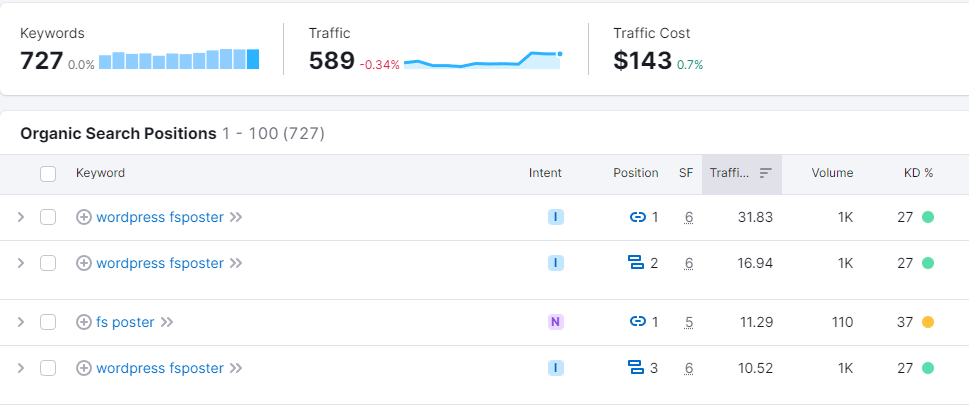
When it comes to search queries, everyone has their own unique way of wording things. We all ask Google for the same thing but in slightly different ways. But you know what? Google is one clever cookie. It’s smart enough to recognise the similarities in these different search queries and understand that they all boil down to the same thing.
Ahrefs studied this a few years ago, and it turned out that the top ranking page would additionally rank for tonnes of other similar keywords too!
Relying solely on the search volume of a single keyword to estimate your page’s potential search traffic is a bit like shooting in the dark. You need a smarter approach! To get a better understanding of the search traffic potential for a keyword, you’ve got to take a peek at those top-ranking pages and see how much traffic they get from the keywords they rank for.
